Translations 677
The Limits of Trump’s Bravado
The Limits of Trump’s Bravado
By Manuel E. Yepe
Exclusive for daily POR ESTO! of Mérida, México.
http://manuelyepe.wordpress.com/
A CubaNews translation. Edited by Walter Lippmann.
“The use of Russian anti-aircraft defense systems by the Syrian army in retaliation to the US missile strike would have provoked a nuclear conflict. That did not come only thanks to the self-control that Vladimir Putin showed as Supreme Commander of Russia”, daily Izvestia daily reported, quoting Sergei Sudakov, member of the Academy of Military Sciences of the Russian Federation.
“Many Russian citizens believe Russia should have repelled the aggression. But those who think that way ignore that, had this been so, the shoot-down of US missiles would have provoked a scenario of conflict between two nuclear powers in the territory of a third country.” According to Sudakov, Trump placed humanity at the doors of a true “hot war”.
Military analyst Vladislav Shuryguin clarified in Pravda that the Russian air defense systems deployed in Syria defend the interests of Russia, and are under the military command of Russia. Thus, “when Israel or Turkey periodically bomb Syria, we can protect our air base and its facilities.” Shuryguin believes the Russians made a political decision, because the shooting-down of US missiles would have undoubtedly led to a conflict between Russia and the United States.
Meanwhile, the Russian Defense Ministry denounced the absence of evidence to support the US accusation about the existence of chemical weapons in the Syrian base of Al Shairat which the US used as the pretext to attack that facility.
Press media, firefighters, police and Syrian authorities who went to the base after the US airborne-Tomahawk missile aggression did not find the presence of deposits or bombs with chemical weapons. “People who work there are going about their tasks with total normality; no one is wearing special suits to handle toxic substances,” said Major General Igor Konashenkov, one of the Russian chiefs of the base.
Obviously, observers’ attention was drawn to the similarity between this situation and the white powder shown by Gen. Colin Powell to justify US aggression against Iraq in 2003, or the report to the Parliament of then-British Prime Minister, Anthony Blair, on alleged chemical weapons in that Arab country that same year.
Impartial observers say the United States used the events as a pretext to punish Syria. At the same time, the US attack would delay the defeat of the Islamic State which would consolidate the position of Bashar al-Assad, Syria’s legitimate leader.
The Syrian government is calling for the creation of an international committee of professional and independent professional experts to investigate the circumstances which led to the Washington’s attack on Syria. This would be the only legal body capable of verifying whether from that air base chemical weapons could have been used.
The Organization for the Prohibition of Chemical Weapons [OPCW] has pointed out that any manipulation or use of toxic substances leaves a trace that can be detected weeks and even months later.
Three years ago, the United Nations verified the total disarmament of chemical weapons in Syria. Therefore, specialized agencies of the world organization would now have to investigate just how the alleged return of this type of weapons to the country took place, and through which border.
All these justifications for the cruise-missile attack on Syria are inconsistent with Donald Trump’s statements during his election campaign. Trump announced that, if elected President, he would oppose the involvement of the nation in international conflicts, something undoubtedly in conflict with the agenda of the real power that governs the empire.
Trump had said he would prioritize the defeat of global terrorism, an objective that also contradicts this attack –which in fact prolongs the existence of the main enemy which he had said the United States should focus on– because, with this attack, he saved the Islamic State from imminent defeat at the hands of the Syrian army.
It has become clear, once again, that the underlying policy of the United States, whoever is President and whichever party is in government, is to prolong wars as much as possible in the interest of profit for the industrial military complex.
Donald Trump clearly is not as absurd as it appears in the performance of his presidency. The thing is that the goals he proclaims are almost never real goals. Sometimes they only express a part of his true objectives, to which he intends to arrive by sleight-of-hand.
Trump’s bravado as president no doubt has its limit there where it surpasses the guidelines fixed by the real power that is not achieved in democratic facade elections.
April 11, 2017.
The Market Forgot About the Elderly

The Market Forgot About the Elderly
By Roberto Alfonso Lara
April 5, 2017
A CubaNews translation. Edited by Walter Lippmann.

In terms of marketing, older people are little valued in the country as an economically attractive group. Illustration by Ari
Living a comfortable old age can be the aspiration of anyone in the world. Some even set it as a goal and work hard to achieve it. But this effort at the individual or family level requires socio-economic support. This implies changes in health-care services, transportation, the stores…
For several years, Cuba has given emphasis to policies to protect senior citizens. The irreversible aging of its population has led to a number of transformations, essentially in public health. Other sectors remain oblivious to the challenge. Marketwise, for example, old people are forgotten.
The country´s stores disregard the needs and preferences of the elderly. The sale of clothing, footwear and food without adjustment to their demands, is proof of the low visibility of this age group in commercial matters. When it comes to selling, gray hair is usually not taken into account.
Somehow, I think there is an incomplete perception about the elderly, which doesn’t realize their true potential. A degree of conformism is attributed to them. The limited satisfaction of their urgent needs often follows that premise. It is usually thought that, due to their age, they lack tastes and interests, and that anything will be good for them.
Neither slippers nor pajamas nor “home scrubs” at reasonable prices are to be found in stores. Neither are light fabric clothing, nor shoes with the proper design to cope with corns and bunions, or anything that gratifies or pleases them. They do stumble upon sneakers and high heels, shiny blouses and tight pants.
Domestically-made garments hardly fill the vacuum. The use of textiles inadequate for Cuba’s hot climate (polyester instead of cotton), make the articles on sale of little use. Industry needs, first, to know in detail the type of customer to whom its products are intended. The same happens with prices, which bear no relationship with the very little money pensioners receive.
In terms of marketing, older people are scarcely valued in the country as an economically attractive group. Nevertheless, nations with similar demographic characteristics find in seniors numerous possibilities as consumers. Several specialists have even argued that the future of the market lies in the grandparents.
If in 2025 one in four Cubans will be over 60, wouldn’t it be appropriate to take another look at the issue? The care of the elderly –a strategic issue in the development of the nation– requires the implementation of comprehensive action in pursuit of greater comfort and quality of life.
The construction and repair of nursing homes and grandparents’ homes, along with new geriatrics clinics, anticipate the way forward. The other lap corresponds to the spheres of production and services. These are still permeated with the stereotype that the elderly do not buy enough.
Because of the size of the changes required, it may be difficult to deal with the needs of old age. For Cuba’s weak economy it is, in fact, a problem. However, all the elements should be thought of instead of continuing to postpone possible options. Not only in terms of clothing or food, also in the constant supply of wheelchairs, canes, hearing aids, mattresses, beds…
The government’s own interest in promoting the active participation of senior adults in the socio-economic life of the country clearly speaks of the need for reorienting the compass towards the current demographic process. Consequently, it is a task for the market to review its current situation and expand what’s available. The elderly, like other generations, need to see their reflection own in the mirror.
Trump, President of the United States
Trump, President of the United States
By Dr. Néstor García Iturbe
April 7, 2017
CubaNews translation by Walter Lippmann.
Recently Donald Trump has begun to show that he is already learning to behave as a true president of the United States. This was shown yesterday, when he ordered that more than fifty Tomahawk missiles be launched against a Syrian air base, under the pretext that the Syrians had used chemical weapons against civilians and opposition troops.
Bashar al-Assad, who was accused of ordering the attack, which was actually launched by the opposition forces themselves, who have been handed over by Turkey. This action in no way benefited the United States’ position in the Syrian conflict, when it was argued that it was no longer a priority of its foreign policy to overthrow Assad.
The true beneficiary of what happened is Israel. It was quick to endorse the attack and encourage an appropriate response from the United States. Trump’s positions have also been strengthened, as he justifies the requested increase in the Pentagon’s budget and allows him to show a strongman image to his Chinese guest, Xi Jimping, with whom he must analyze, among other things, the situation of North Korea’s atomic development.
Among those demanding this type of action is Hillary Clinton, who came out of her lethargy last Tuesday, stating that “the United States ought to bomb Syrian military air bases in response to the apparent chemical attack.” The big American press has commented on the fact, but it has not condemned it. So far, as far as I know, no major popular demonstrations against Trump are being organized for the bombing of the Syrian base.
Of course, we will always find those who want to magnify this situation as another sign of their aversion to Trump and that they are still suffering from Hillary’s defeat. Expressing himself thus was a sign of his ignorance in relation to what the United States represents in the world, what his foreign policy is and how a president of that nation acts. By the way, in Trump’s case, although he deserves to be criticized for bombing the Syrian base, we can say that by comparing this with what was done by Obama, Winner of the Nobel Prize for War, he still reveals himself to be a beginner.
In Afghanistan, where US troops are still found, bombings and other military actions have cost the American taxpayer more than $3 billion, the death of about 2400 military and hundreds of thousands of civilians.
In Iraq, the ongoing military adventure has cost more than $6 billion, 4500 military personnel killed, 33,000 wounded and more than one million Iraqi civilians killed.
In Libya, daily bombings ordered by the binomial Obama-Hillary cost $1.1 billion, in addition to the Libyan military, and killed more than 80,000 civilians. Still, war continues and civilians continue to die.
In Syria, where the Obama administration began its participation in the war on September 10, 2014, activities began precisely by bombing different facilities in the capital and other cities as part of supporting anti-government forces. It is estimated that the bombings have cost about $800 million dollars, in training and logistical support to the rebels $600 million. As a result of the bombings and actions carried out by the rebels, more than 100,000 civilians have died and a large part of the country has been destroyed.
We could say that Trump is still warming up, he started pitching in this inning and he may give a good performance, but to beat pitchers like Obama he needs a lot more experience.
I hope this will help some of our compañeros gain a true understanding of a US president’s way of acting and not be surprised when he orders a bombing of a military base or a coup in Venezuela. That is part of his job.
Jodie Foster meets the Acosta Dance Company

Jodie Foster meets the Acosta Dance Company
 American actress and film director Jodie Foster is visiting Havana, where she attended an “Acosta Danza” rehearsal this Thursday and held a dialogue with the members of the company founded and directed by Cuban dancer Carlos Acosta.
American actress and film director Jodie Foster is visiting Havana, where she attended an “Acosta Danza” rehearsal this Thursday and held a dialogue with the members of the company founded and directed by Cuban dancer Carlos Acosta.
From the presence of Foster, winner of two Oscars for best actress in 1989 and 1992, at the headquarters of “Acosta Danza” the photos talem posted on the page of the set on Facebook, which she appears with the dancers.
Foster witnessed the rehearsals of “Belles Lettres,” a piece by New York City Ballet’s resident choreographer, Justin Peck. It will be premiered in the upcoming spring season of “Acosta Danza,” scheduled for April 21-23 at the “Alicia Alonso” Gran Theater of Havana.
Peck created Belles-Lettres in 2004 for the NYCB. It became became one of the trump cards of the American choreographer right away.
He was also able to appreciate the preparation for the work “Fauno” by the Belgian choreographer Sidi Larbi and the duet “Nosotros” by Cubans Beatriz García and Rafael Reinoso, according to Lester Vila, a spokesman for Cuban dance company .
Jodie Foster, internationally recognized for her roles in films such as “Taxi Driver”, “Silence of the Lambs” and “Panic Room”, now joins a list of US artists. Who have visited Cuba following the approach initiated by Havana and Washington in December 2014 and the diplomatic thaw that took place months later.
Since then, Cuba has become a tourism destination, and has been visited by American film actors such as Robert de Niro, Ethan Hawke and Tim Robbins, and music figures such as Madonna, Katy Perry and Rihanna and the rocker Jon Bon Jovi.
A CubaNews translation. Edited by Walter Lippmann.
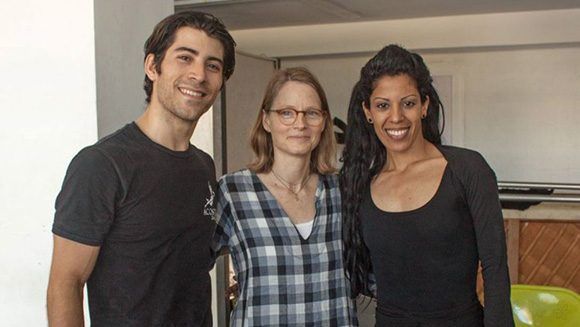
Josie Foster visits the studio of the Acosta Dance Company. Photo: Facebook/Acosta Danza
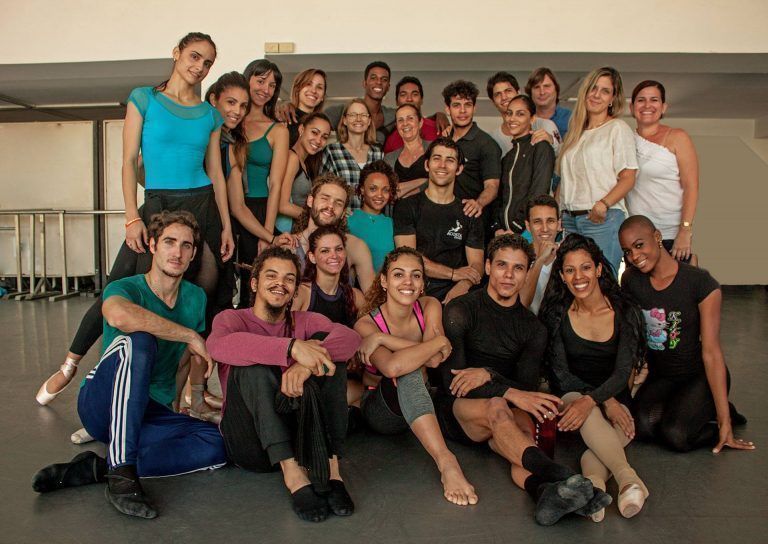
Josie Foster visits the studio of the Acosta Dance Company. Photo: Facebook/Acosta Danza
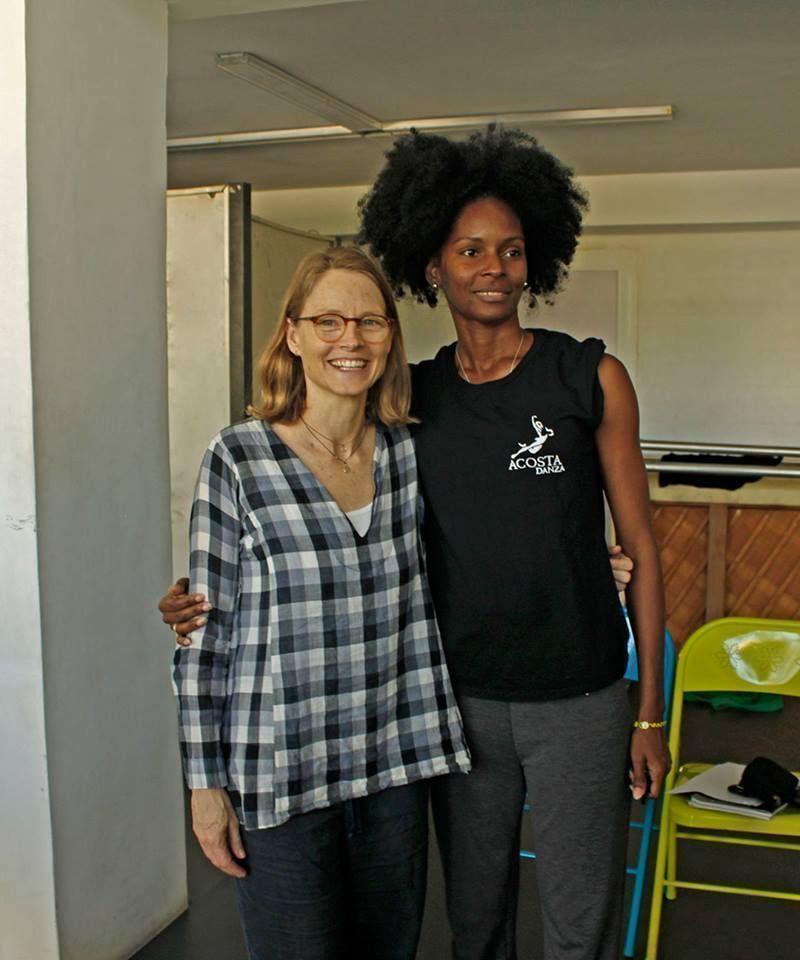
Josie Foster visits the studio of the Acosta Dance Company. Photo: Facebook/Acosta Danza
Jodie Foster shares with CENESEX specialists

Jodie Foster shares with CENESEX specialists
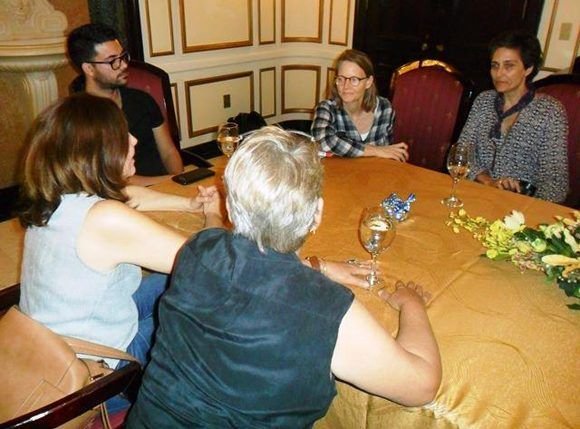
Jodie Foster discusses the work of the National Center for Sex Education (Cenesex) with Dr. Mariela Castro. Photo: Taken from the Facebook of Mariela Castro.
A CubaNews translation by Walter Lippmann.
Recently, actress and American film director Jodie Foster was in Cuba. During her visit to Havana, the winner of two Oscars for Best Actress in 1989 and 1992 shared with specialists from the National Center for Sex Education (CENESEX).
Dr. Mariela Castro Espín shared her impressions about the meeting with Jodie on Facebook today:
“It was a pleasant surprise that the American actress Jodie Foster showed interest in knowing about our work at Cenesex Cuba, during her recent private visit to the Island with her wife, Alexandra Hedison, and her sons Charles and Kit, with whom we had a beautiful family evening” .
Open to scientific search, exchange of experiences and dialogue of knowledge, CENESEX counts on professionals of recognized prestige from different scientific disciplines who use a comprehensive approach in the study of sexuality.
Foster, whose performances in Taxi Driver, The Silence of the Lambs and Panic Room have always been in the memory of her followers, has now been added to the list of artists of the United States who have visited the Island after the approach initiated by Havana and Washington in December 2014.
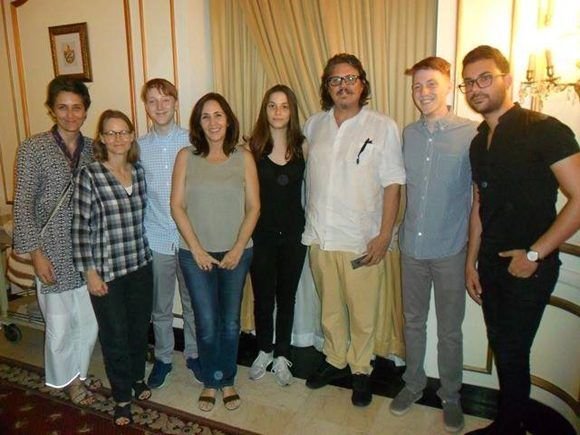
Jodie Foster took a family photo with Cenesex specialists. Photo: Taken from the Facebook page of Mariela Castro
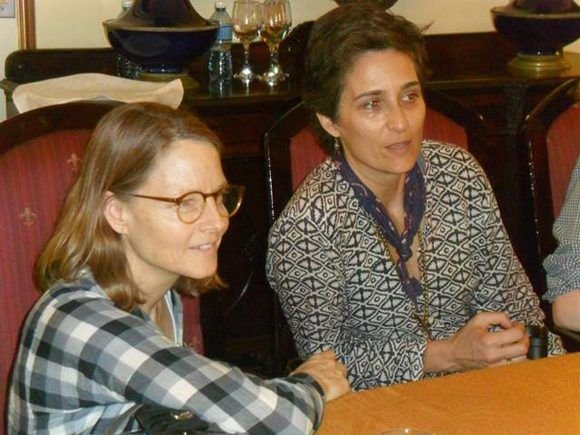
Jodie Foster together with her wife Alexandra Hedison. Taken from the Facebook page of Mariela Castro.
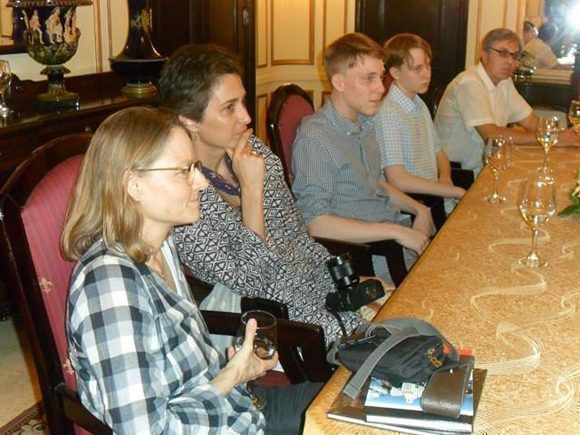
During her visit to Havana, the winner of two Oscars for Best Actress in 1989 and 1992 shared with Cenesex specialists. Photo: Taken from of the Facebook page of Mariela Castro.
Yevgeny Yevtushenko: Poetry Himself

Yevgeny Yevtushenko: Poetry Himself
At the International Poetry Festival of Havana, with the presence of this outstanding Russian poet, a reading of his work was made at the Casa del Alba Cultural de La Habana
Author: Madeleine Sautié | madeleine@granma.cu
May 30, 2016 21:05:48
A CubaNews translation. Edited by Walter Lippmann.
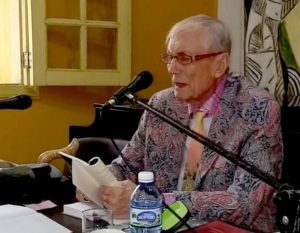
Yevgeny Yevtushenko read his poetry at the Casa del Alba Cultural.
Photo: by the author
Much and much deserved is his notoriety. Among the main epithets he was given was that of being, if not the most, at least one of the most famous poets in the world. For this reason, the International Poetry Festival of Havana (FIPH), which now extends its epilogue to the east of the country, reserved among its events a unique reading by Yevgeni Yevtushenko. It was an occasion when the Casa del Alba Cultural Center in the country’s capital city welcomed him with a new audience that –on more than one occasion– applauded him.
Nominated more than once for the Nobel Prize for Literature, the poet, born in Siberia, Russia, in 1933, is familiar with crowds that gather to listen to him. At the age of 22, his love poetry gave him a popularity that grew with his readings in public spaces. In two occasions 6500 people crowded the Kremlin theater to enjoy his poetry.
In the life of this singular being –unique for his authentic poetry and his peculiar way of dressing– reading has been a common exercise. This time it was one more of his typical expressions. Yevtushenko read his poems for more than 90 minutes and between them he gave his audience those sparks that he usually inserts to even more brighten up his astonishing poetry.
After reading excerpts from his book Dora Franco, written in 2011, “with the permission of its heroine, “the Colombian model who accompanied him during his tour of that country where he arrived in his youth as part of a Latin American poetry tour, Yevtushenko chose, among other poems “The Execution of Stenka Razin”; “In the Country Called More or Less”; and “The Key of the Comandante”, dedicated to Che Guevara.
The reading of The Execution … allowed the public to enjoy the 14 different rhythms he mentioned before starting. This is a song to freedom and the evocation of a just leader who defended the peasants. Claiming to have had the illusion of witnessing the facts described in the epic song, the poet read aloud the text in which he describes the public execution of the hero. With remarkable impetus he reached the concluding verses: On the Tsar’s head/chilled by those devilish eyes/the Cap of Monomakh began to tremble/ and, savagely/not hiding anything of his triumph/Stenka’s head burst out laughing at the Tsar!
The key … served to listen to this man, who claims to be a bearer of a poetry that is “a personal confession put into verses,” from his political stance, which allows him to write with exquisite beauty events such as the death of the Heroic Guerrilla and disapproval of converting his sacred image into merchandise. “We do not know, sir, we do not know …” / Where is the key to the future? / The fear of not finding it, panic grabs us. / But the key is in your hands, / I’m sure. / (…) To the left, / boys, / always to the left / but not to the left / of your heart.
In the Country … one can see the poet’s critical and foresightful gaze against evils that corrode the best political purposes, such as bureaucracy, corruption and opportunism, among other human vices that violate the integrity of character, all expressed with great irony. (I would like to stand in front of God, as I am, / not as someone more or less. / Not being more or less happy / in this more or less life … / In this more or less freedom.
But the poet of the great audiences –whose work has been translated into more than 70 languages– and who stirred so many hearts more than six decades ago with his intense love verses, now at 83 years of age, has still much to tell us about the most universal of feelings.
In the presence of his wife Masha, he read –once again for her– and for all: I Love You More than I Love Nature, a poem with which he begins his book Stolen Apples, recently published by the collection Sur of the FIPH (still available at bookstores).
I love you recklessly / as an abyss, not as a small ravine. / I love you more than all possible, / and also more than all the impossible. He read and everyone could see this other side of the poet: earthly and in love. He continued: I love you more than my homeland / because my Homeland is you. Masha is perhaps the inspiration; but the emotion was shared, because we knew we had witnessed poetry itself.
Frank Manitzas (1931-2017)
Frank Manitzas (1931-2017)
By Dr. Néstor García Iturbe
March 19, 2017
A CubaNews translation.
Edited by Walter Lippmann.
On March 12, 2017, the American journalist Frank Manitzas died.
Among the journalistic assignments he covered were the assassination of Robert Kennedy, and the coup d’état against Salvador Allende, during which his house was assaulted by the gendarmerie under the orders of Pinochet and his family was arrested at gunpoint.
In the year 1980 during the Mariel was in Cuba with Peter Jennings, a presenter of the American television. He made articles on Cuba’s advances in medicine and education, and won several threats against his life.
During his travels in Latin America, he frequently denounced the CIA’s activities against governments and leftist movements.
He was a journalist with a high professionalism, ethics and human feelings.
Dr. Néstor García Iturbe
========================
During his tenure with CBS in (1967 to 1974) Frank Manitzas covered the assassination of Robert Kennedy, the lunar landing and Pinochet’s coup in Chile. He’s pictured here with CBS News legend Walter Cronkite. Courtesy JB Diederich
BY HOWARD COHEN
Frank Manitzas, a Dupont-Columbia Award-winning journalist who covered the world’s first heart transplant in 1967, Robert Kennedy’s assassination in 1968, the 1969 moon landing, the Iran hostage crisis in 1979-81, Augusto Pinochet’s coup in Chile in 1973 and the Mariel boatlift in 1980, died Sunday.
Manitzas, who coordinated news coverage for ABC, CBS, NBC and the Associated Press for 40 years, was 85.
“He was my bureau chief at the ABC News bureau in Coral Gables — during the most turbulent times in Latin America,” said ABC News correspondent John Quiñones, host of “What Would You Do?” “I arrived there as a rookie correspondent in 1982 and Frank was my guiding light through all kinds of mayhem in Nicaragua, El Salvador, Panama.
“Frank was a reporter’s reporter,” Quiñones continued. “He was brash and unrelenting in pursuit of the truth — the kind of journalist who never took ‘no’ for an answer. Time and again, ABC beat all the other competing network producers on the story — whatever it was — because Frank would get there first. He seemed to be everywhere, charming everyone from presidents and diplomats to guerrilla leaders, cab drivers and telephone operators — always in his trademark guayabera and with his warm and engaging Texas drawl. If I ever traveled without him he would yell at me on my out the door, ‘Just tell them Frank Manitzas sent you.’ Sure enough, doors would swing open upon my arrival anywhere from Mexico to Cuba, Brazil and points beyond.”
EVERYONE SEEMED TO KNOW FRANK AND EVERYONE LOVED HIM. AT A TIME WHEN DICTATORS, DEATH SQUADS AND THE CIA WERE WREAKING HAVOC IN LATIN AMERICA, HE WAS THERE, FEARLESSLY SOUNDING THE ALARM AND SHINING THE LIGHT OF JOURNALISM ON THE DARKEST CORNERS OF THE CONTINENT. BY DOING SO, HE LITERALLY MADE THE WORLD A BETTER PLACE.
ABC News correspondent John Quiñones.
To daughter Elena, Manitzas was “just my Daddy” — a kind and good-humored man. “Other than being a great journalist and always on top of the story he was just really a good person and caring about other people. That’s what I learned from him.”
Born to Greek immigrants who settled in San Angelo, Texas, the Texas A&M journalism graduate bore witness to some of the 20th century’s biggest stories during a career that stretched from the AP in 1955 through his retirement from ABC News as its bureau chief for Latin America in Coral Gables in 1994. Post-retirement, he continued as an independent journalist covering Cuba and the Americas for various websites.
His work often put him in danger. Manitzas reported live on the streets of Santiago, Chile, when the government of Salvador Allende was overthrown in September 1973. The Manitzas home was raided in an allanamiento (a break in). His wife Nita, an outspoken Latin America expert and supporter of the victims of the new military regime, was held at gunpoint, as were their two children.
“Our house was searched and they were going through these papers from the wire service and all of a sudden all of these Playboy magazines fall to the floor,” Elena recalled. Her mother giggled but was secretly terrified the intruders would search the attic and find her stash of forbidden Allende posters.
Manitzas came home after the raid, Elena said. “Dad says, ‘What’s new?’ Runs upstairs,” then races to his office to file the story. “Later, when he comes back, he says, ‘Are you OK?’”
MANITZAS PENNED UNPOPULAR EDITORIALS WHILE AT TEXAS A&M TO ALLOW WOMEN ENROLLMENT IN THE EARLY 1950S — “A&M GOES COED OR IT GOES TO HELL” —MORE THAN A DECADE BEFORE IT HAPPENED.
Said longtime friend Bernard Diederich, a retired Time bureau chief for Miami and the Caribbean: “He was very good and became persona non grata in those areas where the military took over and very much a hands-on reporter.” Diederich remembered the time he saw Manitzas flying down the road on the back of a motorcycle to cover Pope John Paul II’s historic visit to Mexico in 1979.
During the bloody 1987 schoolhouse massacre in the wake of Haiti’s first free elections in 30 years, Diederich’s son JB and Manitzas, along with members of his ABC News crew, were shot at. Some were injured. “It was Frank who had us evacuated on a Learjet,” JB Diederich said.
In 1980, during the Mariel boatlift, Manitzas did a week-long series with ABC anchorman Peter Jennings from Cuba on advances in medicine and education on the island. His reports led to death threats.
However, not all of his reporting was fraught with danger. In 1967, he traveled to South Africa to cover the first heart transplant done by Dr. Christiaan Barnard, who insisted it was much ado about very little, that he had performed many successful liver transplants. “Have you ever told a woman, ‘I love you with all my liver?’” Manitzas countered.
FRANK WAS AN OLD SCHOOL JOURNALIST. HE WAS LIKE A SECOND FATHER TO ME. HE HAD AN INFECTIOUS SMILE AND LOVED HIS PROFESSION, BUT HIS BIGGEST LOVE WAS ALWAYS RESERVED FOR HIS LATE WIFE NITA AND HIS KIDS NICK AND ELENA.
Miami photojournalist JB Diederich.
As CBS special effects producer, Manitzas was also in charge of the recreation of the lunar landing in 1969, just in case live video reception fizzled. He designed a big, hollowed-out lunar module and had someone pose as an astronaut inside a space suit. Of course, that poor “astronaut” learned quickly that earth’s gravity made that suit so much heavier here than on the moon, his daughter Elena said.
Manitzas sometimes did his work too well. When conspiracy theorists found out about his footage, it gave them ammunition for years that the lunar landing was a hoax concocted by TV.
Manitzas is survived by his son Nikola and daughter Elena Manitzas, siblings Marie Crumly, George, Mary and Demetrios (Jimmy) Manitzas and his six beloved cats. His wife, Nita, died in 2008. The family will be holding a private gathering at their home.
The family requests donations to the Committee to Protect Journalists or similar organizations like Amnesty International, ACLU, Center for Constitutional Rights, Center for Cuban Studies or WOLA.
Howard Cohen: 305-376-3619, @HowardCohen
We are All Ecuadorians
We Are All Ecuadorians
By Ricardo Alarcón de Quesada
A CubaNews translation.
Edited by Walter Lippmann.
“Everything can be bought except the heart,” proclaimed candidate Lenin Moreno in Guayaquil at the close of his campaign that will culminate on April 2 with the ballot to decide who will be the next President of Ecuador. Already the former Vice-President had defeated all the others in the February elections in which he achieved a crushing vote and was a few votes short of obtaining the required majority -40% – to avoid a second round.
Then some spokesmen of the oligarchy threatened to “burn Quito” if Moreno, who got over a million votes more than the banker Guillermo Lasso, was proclaimed victor. Lasso, a character of this ungrateful memory, an ex-Minister directly linked to the disaster that in 1999, among other things, eliminated the sucre as Ecuador’s own currency, forcing the adoption of the dollar as a local monetary unit, and which led to the mass flight of about two and a half million Ecuadorians suddenly thrown into poverty.
Next Sunday, Ecuadorians will have to decide whether to return to that painful stage or continue to advance along the path of the Citizen Revolution initiated by President Rafael Correa ten years ago. It’s record, in terms of a more just redistribution of national income, raising from misery to two million people and shows remarkable progress in education and public health, an admirable work in roads, transport and communications and above all, the rescue of national sovereignty and a clean government dedicated to the benefit of the majority . No one has done so much in such a short time for justice in one of the most unequal countries of the Earth and had to do it in very difficult conditions as a result of the fall of oil prices, a huge earthquake and other natural calamities.
A ferocious and multi-million dollar media campaign is committed to confusing the people, promoting collective amnesia and dragging it to vote against itself. It is now time for the Ecuadorians to decide.
But what is at stake goes beyond the small and beautiful country. Next Sunday, Ecuador will literally be at the center of the world. There will also be decided the future of an emancipated Latin America in front of an Empire that seeks to restore its battered hegemony.
Initially posted to Ajiacomix, March 29, 2017:
https://ajiacomix.wordpress.com/2017/03/29/todos-somos-ecuatorianos/
A necessary and united mobilization
La Opinion
A necessary and united mobilization
This is the time to achieve unity to deal with Trump
By EDITORS
Google translation.
Revised by Walter Lippmann.

Immigrants Rights mobilization 2006
There were hundreds of thousands of people who marched on March 25, 2006 in Los Angeles. / Archive PHOTO: ARCHIVO / JEFF GRACE / IMPREMEDIA
BY: EDITORS
24 MARCH 2017
In 2006 the immigrant community throughout the nation went out massively against the H.R. 4437, the law which was to criminalize all undocumented. Now we live another moment of urgency that requires a similar demonstration of repudiation. The date is 1st. May 1st to denounce and resist against a cruel immigration policy.
Today the situation is much worse than that of 11 years ago.
Before the mobilization was preventive. The purpose was to warn of a threat that appeared to justify the persecution of the undocumented.
Now that threat has become a reality. H.R. 4437 failed, but its designs are being implemented by President Donald Trump more than a decade later.
The president’s campaign rhetoric that relied on anti-immigrant resentment came true with his executive orders. The criteria were extended so that a person could be deported and a freedom of action was given to the agents of the Immigration and Customs Enforcement Agency.
The result is a policy that has terrified the Latino community due to its arbitrariness, its methods and its impact on the family.
In cities and states of our country, it is seen that the fear of ICE ‘s aggressive actions, for example, is reducing the attendance of Latinos at church,. And the drop in the number of reported crimes, such as domestic violence and sexual abuse – for fear of deportation – worries Los Angeles police.
There are arrests they make in the courts, in the vicinity of schools and even the Dreamers. These are outrageous as the accounts of separated families and detainees who are not on the list.
This May 1st is the time to protest against this persecution in a coordinated and effective manner, unlike the disorderly “Day without Immigrants” on 16 February.
International Labor Day represented the migrant worker for a long time in the United States. Now the march has ample support from the labor sector which feels the impact of the Trump administration.
We join this protest. To march without fear, not to buy and to support the immigrants that day even if it is with a sign of support in the window of an automobile.
This is the time to resist with all the legal weapons at our disposal. Let’s use them!
Public Masturbation in Cuba

Since when has there been public masturbation in Cuba?
By Roberto Alfonso Lara, February 7, 2017
A CubaNews translation.
Edited by Walter Lippmann.

Elena has a sort of magnet for that. Going home or on her way to work, her eyes seem condemned to stumble upon the same scene. On a park bench, behind the post, hidden in any bush or in some old construction site, she finds the man who masturbates; he looks at her and comes out of his den to tempt her.
She suffers the “fate” of a society where flashers assault public spaces, determined to solve, openly, what they do not achieve on a personal level or in intimacy with their partner. She has knocked on doors several times and presumes that nobody is listening. No one responds when she claims to feel somewhat raped, everyday, on the street.
Women are the main target of this sexual aggression if we consider the common intention of the act or the underlying cultural background: machismo. By showing their genitals and masturbating in public places, men in fact exercise their power against women. But, is this only a gender-related problem?
Despite their sex, there is no choice for those who bump into addicts bent on showing the size of their penises and getting excited in broad daylight. When the person displays toward the stalker an attitude of surprise, panic or simple rejection –almost always going out of their way– it is because the person feels that her or his rights have been invaded and therefore violated.
Although women are the most affected, the problem concerns all citizens and should be addressed from that perspective. This involves a security issue: who can feel safe and protected while sexual flashers are present in the spaces we share?
Movie theaters used to be their favorite site, today they do not waste time in distinctions. Elena finds them everywhere, and sees them approaching her, chasing her, with their dicks in their hands, fully aware of the panic they cause. She is frightened and has come to see me in despair. She doesn’t know what street to take to get home in the evening.
Few people report the crime to the police, it’s true. But… what happens if they do? Do Cuban laws strongly condemn these cases of sexual harassment?
Decree Law 141, on the contravention of public order, sets a fine of 40 pesos to those who “offend modesty or good customs with lewd exhibition”. There is no other provision about it, not even to define the limit or scope of the lewd act. And the small fine, well … it’s almost like paying a cheap license to masturbate out in the street.
Without rigorous measures against those who violate collective coexistence, and go to the extreme of sexually harassing women and disrespecting an elementary norm of civility, every effort to eliminate the problem will suffer the same “fate” as Elena’s when, after knocking on many doors, she feels no one cares about her fear.
Yes, masturbation is a legitimate way of experiencing sexuality, but doing it visibly in open places is detrimental to the human condition. Neither institutions nor society as a whole should remain indifferent to this type of violence.
It is said that the first complaint in Cuba against masturbators in public places was registered in 1881. It is painful to say this: how long will Elena have to wait?
Subscribe to Blog via Email
| M | T | W | T | F | S | S |
|---|---|---|---|---|---|---|
| 1 | ||||||
| 2 | 3 | 4 | 5 | 6 | 7 | 8 |
| 9 | 10 | 11 | 12 | 13 | 14 | 15 |
| 16 | 17 | 18 | 19 | 20 | 21 | 22 |
| 23 | 24 | 25 | 26 | 27 | 28 | 29 |
| 30 | 31 | |||||


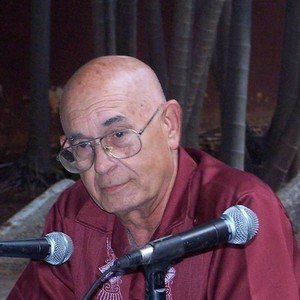
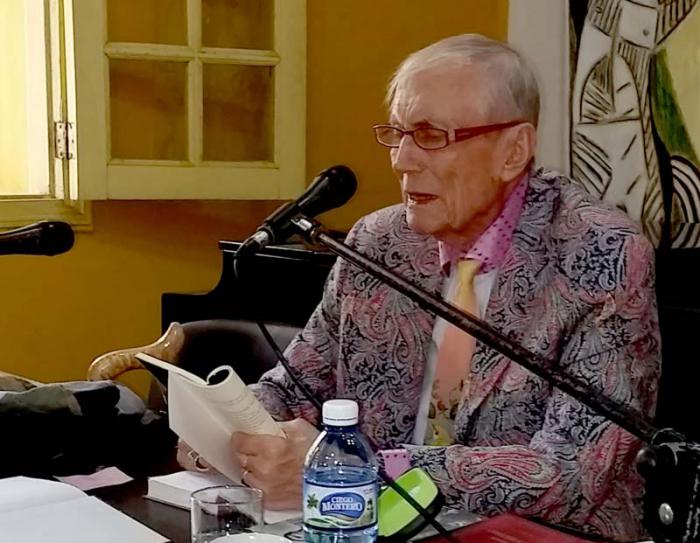

You must be logged in to post a comment.